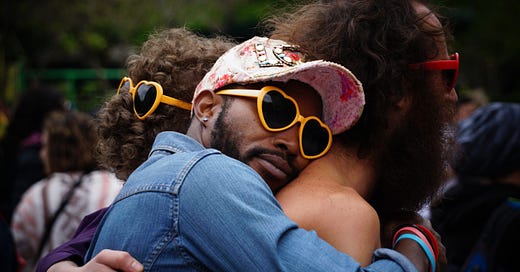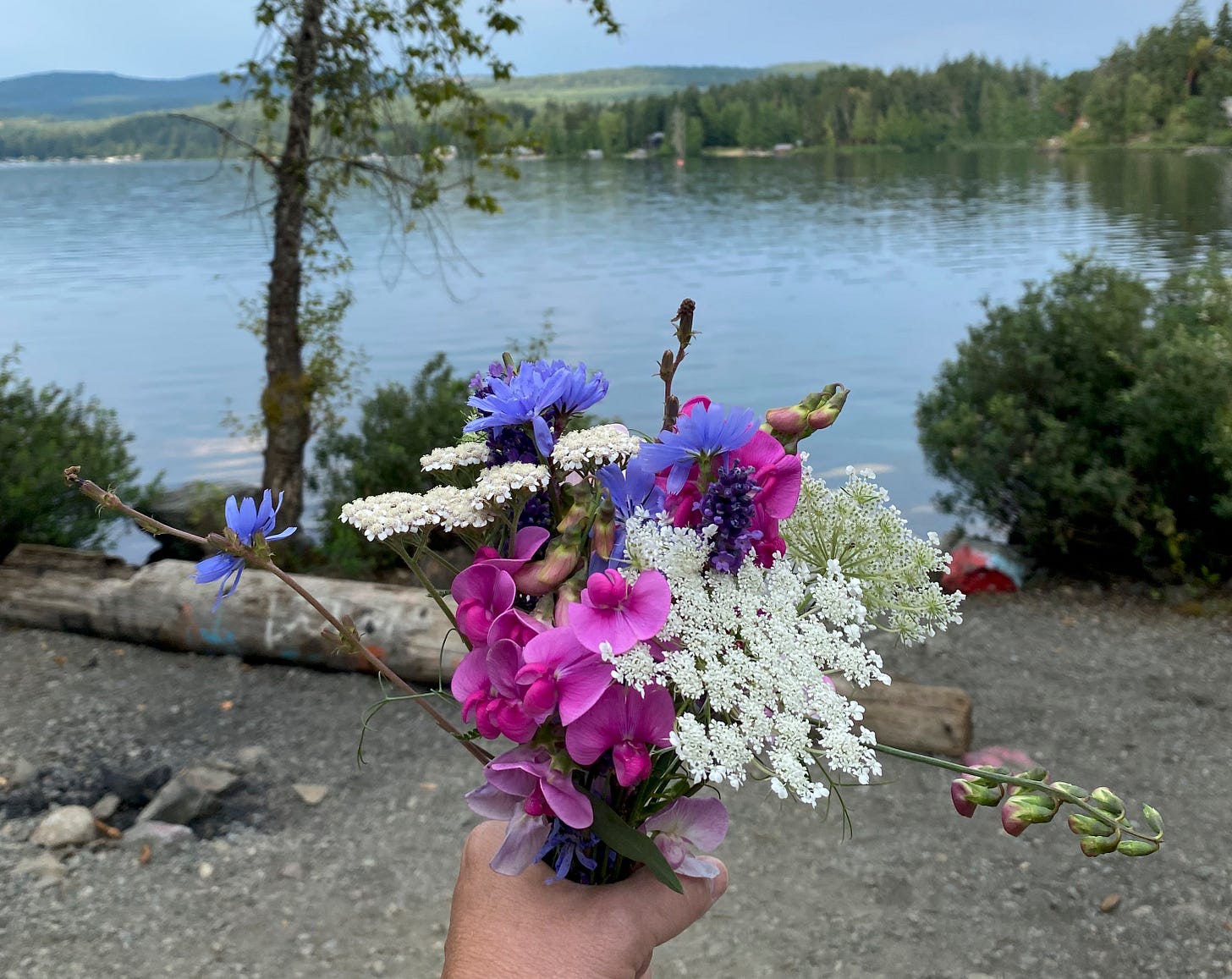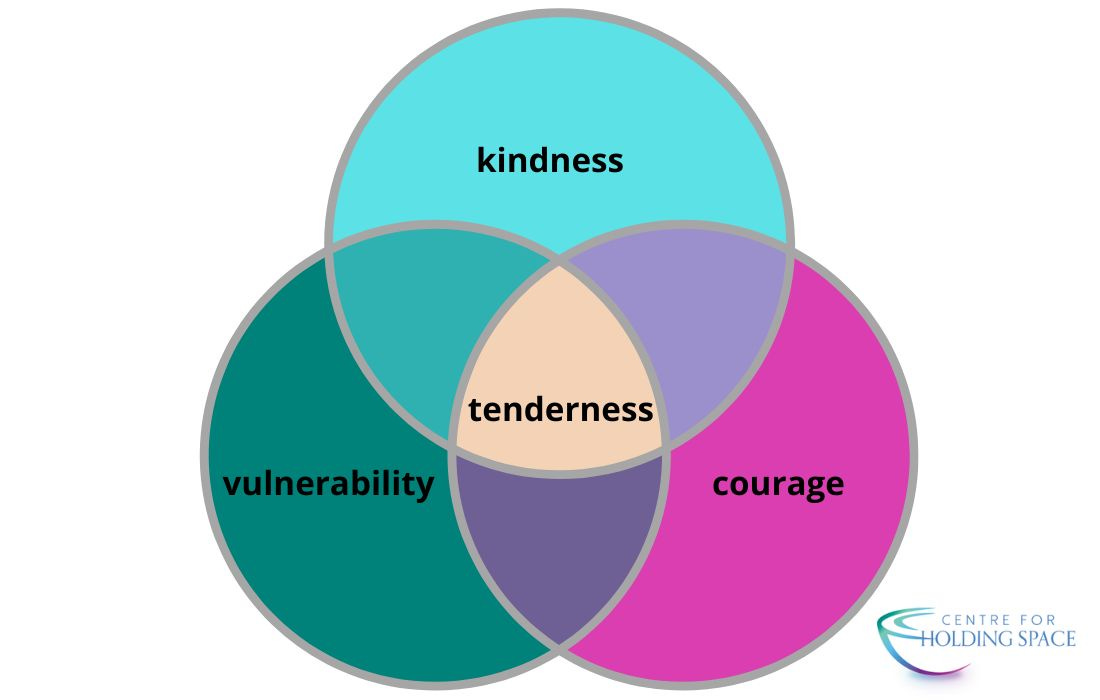Why Tenderness Still Matters (and always will)
Despite recent discouragement, I remain committed to the cause
As I shared in last week’s post, I was discouraged and struggling with a vulnerability hangover at the end of my book tour for Where Tenderness Lives. A part of me was tempted to withdraw, shut down, and put up walls. That protective part questioned the wisdom of putting my tender heart on the line again and again for this work.
This past weekend, I was scheduled to teach an in-person workshop on Writing with Tenderness. Because of the way I was feeling, preparation was a struggle. “I kinda want to walk in the room, say ‘DON’T!’ and then walk out,” I said to Krista, my business partner, who gets to hold a lot of space when I get cynical, discouraged, and/or burnt out.
But, of course, I didn’t do that. I rallied my resources and recommitted myself to this work of bringing more tenderness into a world that needs it. And, of course, the workshop was beautiful and the people who gathered helped to nourish me and remind me why it all matters.
Unlike my book tour events (which I drove many miles for), this workshop was in my neighbourhood. I simply had to lace up my walking shoes, walk down the hill to the lake, follow the path to the other side of the lake, and cross the lush grounds of the private school where the art camp was being held.
On the second morning, as I walked beside the abandoned train track that runs along the lakeshore, I gathered a bouquet of wildflowers to place in the centre of our writing circle. It felt so humane and grounded (and, dare I say, tender?) to gather those fragile blossoms in their riotous colours for our circle to enjoy as they spilled their longings, joy, and pain onto the page.
After two days in that circle, I’m here to tell you, once again, that tenderness matters. It matters A LOT, and I’m going to keep shouting it from the rooftops, even though I occasionally feel tempted to abandon it.
Tenderness lives at the intersection of kindness, courage, and vulnerability. We can be kind, courageous, or vulnerable without necessarily being tender, but when all three show up together, there is tenderness.
Here are some of the reasons why tenderness matters:
Tenderness connects us with each other. Healthy relationships are built on a foundation of tenderness. Consider a moment when you felt deeply connected to another person – that’s a tender moment, made possible by your willingness to be tender. If you don’t bring kindness, courage, and vulnerability into a relationship (or community), and if you don’t nurture and protect that tenderness, then the relationship will always remain guarded and surface-level. True connection will fail to materialize. Also, people often end up hurting each other when tenderness disappears from a relationship.
Tenderness is how we soothe our nervous systems. When a person’s nervous system has been activated into fight, flight, freeze, or fawn, the most effective ways of soothing that nervous system always involve some form of tenderness – whether it’s through self-regulation, co-regulation, or eco-regulation (regulating in/with nature). One of my favourite methods for soothing my nervous system is through havening touch (thank you to Dr. Robin Youngson for introducing it to me) which involves the most tender touch on one’s own skin. Another is by leaning into the softness of a moss-covered tree trunk along the lakeshore.
Tenderness is the portal to our healing. I don’t think there’s any way to heal trauma that doesn’t involve tenderness. You can’t heal it with anger, frustration, resistance, vengeance, stoicism, intellect, or even justice (though some of these things may be part of the journey toward healing). Becoming tender may feel risky when you’ve been wounded, because it opens you to the grief, pain, betrayal, etc. related to the wound, but it’s the only way through.
Tenderness is part of our truest, wildest nature. As I’ve deepened my practice of both holding space and tenderness, I’ve spent a lot of time immersing myself in nature and learning more and more about what it means to be OF nature – not set apart from it (the way our cultures have taught us to be) but fully part of it. One of the things that feels very clear is that when we open ourselves to the wildest, truest parts of our nature, tenderness is there. It’s not ALL that’s there (it needs to be balanced by other qualities – as mentioned further down in this post), but it’s definitely an important part. To be fully human is to be tender. When we shut down our tenderness, we shut down our humanity.
Tenderness reveals us to ourselves. When we learn to access our tenderness, we have more access to our desires, longings, passions, heartaches, and delights. We reconnect with those parts of ourselves we might have sent into exile when it wasn’t safe to reveal them. We learn to recognize what moves us, what attracts us, what challenges us, what triggers us, and what shuts us down. To become self-aware, self-reflective and authentic, we need tenderness.
Tenderness reveals us to each other. If you truly want to know someone, or you truly want to be witnessed by someone, you need to open yourself to tenderness. Tenderness helps us see each other as complex, messy, wounded, beautiful people. Tenderness helps us soften our biases and bigotry toward people who are different from us. We learn to live with difference more effectively when tenderness is present.
Tenderness reveals the world to us. When we look at the world through tender eyes, we see things differently. Yes, we see the hurt more clearly (and that can feel heavy and sometimes overwhelming), but we also see the beauty. Consider a moment when you’re looking at the sunset and your eyes well up with tears over the sheer beauty of it – that’s a tender moment when you’ve opened yourself to awe and delight.
Tenderness is how we resist and transform the Hard P’s of harmful systems. The dominant systems that shape so much of our culture and impact the ways we treat ourselves and each other (patriarchy, colonization, white supremacy, capitalism) are not tender systems. Instead, they have used what I call the Hard P’s to control and colonize us. The Hard P’s - perfectionism, performance, purity, punishment, productivity, protectionism, and policing - shut down our humanity. When we treat ourselves and each other with tenderness, we resist these systems and give them less power. When those systems are diminished, we can co-create more tender systems in their place.
Tenderness is the soil in which seeds can be planted and grown. Seeds don’t grow well in hard ground – they need the soil to be broken open and softened. In tender, soft soil, seeds can take root, water can be absorbed, and growth can happen. The same is true for us – when we are tender, we are more open to growth and transformation.
Here are a few other things that are important to know about tenderness:
Tenderness can be risky. Tenderness can open the doorway to shadow, grief, trauma, etc. When people are used to closing off their tenderness or aren’t very skilled at the practice of it, it can feel really dangerous for them to encounter it, and that can bring shadow into the room. Behaviour can get ugly, both in protection of themselves and defence against those asking them to risk being tender. This is where our holding space practice is necessary – we use our wisdom, discernment, and intuition to know when a container is strong enough to hold tenderness.
Tenderness needs healthy boundaries. When we access our tender nature and allow it to take more space in our lives, we have to be prepared to protect that tenderness from those who would harm it or take advantage of it. It’s a time when we have to be honest with ourselves about who has the capacity to hold space for our tenderness and who doesn’t. We become more judicious about who we’ll trust with our tenderness and what behaviour causes harm to our tender nature.
Tenderness will be misinterpreted as weakness by those most afraid of it. We all know people who will ridicule, dismiss, gaslight, bully, mock, and take advantage of tenderness. To them, tenderness is weakness, and weakness is shameful. Few of these people are able to articulate the fact that they are afraid of tenderness – instead they will use everything in their arsenal (whether consciously or unconsciously) to defend against it.
When we resist them with tenderness, dominant systems will fight back. Just like the people who create them, systems become reactive when they sense a threat. A tender culture poses a threat to a system that has dominated and controlled people through perfectionism, policing, and all the other Hard P’s. That’s why, during tumultuous times, we often find ourselves with leaders whose policies and behaviour are the opposite of tender – the system is doing its best to protect itself.
Tenderness needs to be held in balance with fierceness and firmness. Our truest nature is not one-dimensional – it is complex and diverse. While tenderness is part of it, so are fierceness and firmness. They may, in fact, be seen as part of the yin-yang balance of what makes us human. Both are held in balance, and both include a part of the other. When we are well-balanced, we know when to draw on each of them and neither is diminished in favour of the other. When systems (and the people that shape them) resist our tenderness, we also need to be able to draw on our fierceness and firmness.
Resmaa Menakem (a renowned trauma specialist and cultural provocateur) was once asked (in the Three Black Men panel discussion shared on this podcast) what the world needs most right now and his answer was “more tenderness”. Other people whose work I admire – like Ross Gay and Prentis Hemphill – have similarly evoked more tenderness as a path to healing and a better future. I couldn’t agree more.
If you want to open yourself to more tenderness, perhaps start with my book, Where Tenderness Lives.
Want to grow your tenderness practice and learn how to hold space for more tenderness in the world? Join us for How to Hold Space - The Foundation Program.
Are you a leader who wants to bring more tenderness into leadership? Join us for Not the Main Character.
Want some one-on-one support in your personal quest for more tenderness? Check out our coaching options.








Thank you, I enjoyed reading this and I always appreciate your writing, it’s nurturing and speaks to a deeper level
I’m in Devon in SW UK
I recently broke my shoulder falling over during a dog walk and it has made me feel very vulnerable due to the pain and exhaustion
I’ve also had a difficult few months dealing with issues of depression in one of my adult children
Work is demanding as a teacher of young autistic adults in a college. Life can swerve around a lot sometimes.
I find your honesty and compassion and self doubt and tenderness to be very helpful and empowering in an emotionally intelligent way.
It must be difficult for you to always have to write and talk when sometimes retreat feels necessary but I guess we can retreat and nurture more but still turn to!
Thank you again
Thank you Heather for this most beautiful post. I grapple with these very same things, as do many I am sure, and your words connect and inspire and move not just yourself forward but those alongside of you. From another person who appreciates your work in Australia.